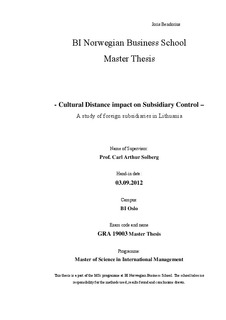Cultural distance impact on subsidiary control : a study of foreign subsidiaries in Lithuania
Master thesis
Permanent lenke
http://hdl.handle.net/11250/94982Utgivelsesdato
2013-02-06Metadata
Vis full innførselSamlinger
- Master of Science [1621]
Sammendrag
Purpose: The purpose of this thesis is to study the relationship between use of different types of control mechanisms (output, process and social) and the cultural context (cultural distance between headquarters country and Lithuania, cultural distance between country of direct accountability and Lithuania, company’s nationality and psychic distance) of foreign subsidiaries in Lithuania and relationship between subsidiary performance and control mechanisms (output, process and social) used to govern foreign subsidiaries in Lithuania. Research design/methodology: A quantitative cross-section survey design based on a questionnaire and Hofstede’s cultural dimensions. Proposed hypotheses are tested using multiple regression and moderation analysis. Findings: The choice of foreign subsidiary control system in Lithuania is influenced by multiple factors of subsidiary’s cultural context. Also Results show that there is a significant link between subsidiary’s performance and control mechanisms exerted over the subsidiary. Research limitations: Studies limitations are related to sampling and breadth of scope. Ability to generalize results is limited to one country setting (Lithuania), Research design/methodology: A quantitative cross-section survey design based on a questionnaire and Hofstede’s cultural dimensions. Proposed hypotheses are tested using multiple regression and moderation analysis. Findings: The choice of foreign subsidiary control system in Lithuania is influenced by multiple factors of subsidiary’s cultural context. Also Results show that there is a significant link between subsidiary’s performance and control mechanisms exerted over the subsidiary. Research limitations: Studies limitations are related to sampling and breadth of scope. Ability to generalize results is limited to one country setting (Lithuania), cross-sectional design and convenience sampling may imply reduced level of details of other influences on subsidiary control. Managerial implications: Research findings can be useful to managers redesigning foreign subsidiary control systems, considering entry and maximizing foreign subsidiary performance in Lithuania. Originality/Value: Impact of cultural distance and country of origin national culture on foreign subsidiary control and subsidiary performance has not been previously studied across foreign subsidiaries in Lithuania. Keywords: cultural distance, psychic distance, subsidiary control, subsidiary performance
Beskrivelse
Masteroppgave (MSc) in Master of Science in International Management, Handelshøyskolen BI, 2013
